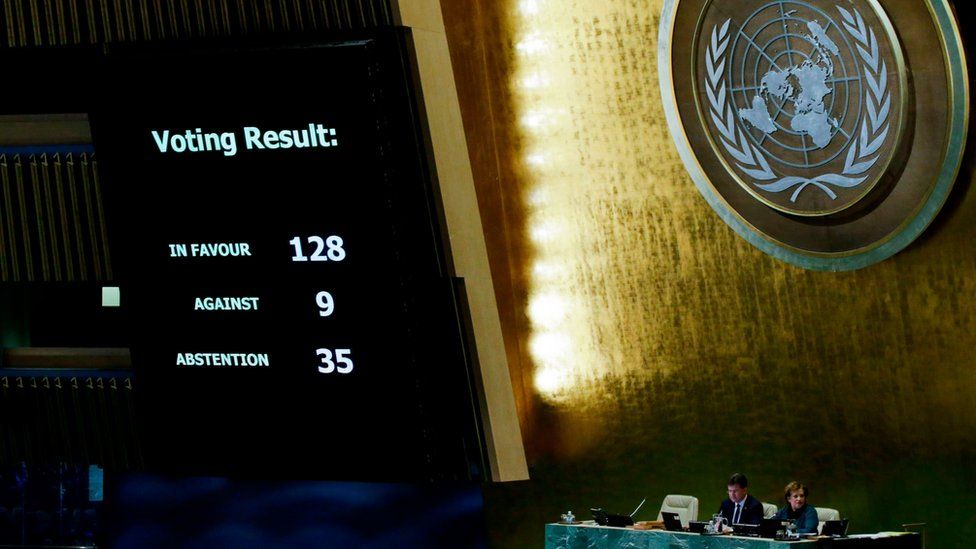How did your country vote on the Jerusalem resolution?
- Published

A resolution backed overwhelmingly by the United Nations has effectively called on the US to withdraw its recognition of Jerusalem as the capital of Israel.
Part of the document reads: "...any decisions and actions which purport to have altered, the character, status or demographic composition of the Holy City of Jerusalem have no legal effect, are null and void and must be rescinded in compliance with relevant resolutions of the [UN] Security Council".
The resolution "calls upon all States to refrain from the establishment of diplomatic missions in the Holy City of Jerusalem".
The nine countries that voted against the resolution were: the United States, Israel, Guatemala, Honduras, the Marshall Islands, Micronesia, Nauru, Palau and Togo.
The 35 nations that abstained were: Antigua and Barbuda, Argentina, Australia, Bahamas, Benin, Bhutan, Bosnia and Herzegovina, Cameroon, Canada, Colombia, Croatia, Czech Republic, Dominican Republic, Equatorial Guinea, Fiji, Haiti, Hungary, Jamaica, Kiribati, Latvia, Lesotho, Malawi, Mexico, Panama, Paraguay, Philippines, Poland, Romania, Rwanda, Solomon Islands, South Sudan, Trinidad and Tobago, Tuvalu, Uganda, Vanuatu.
The 128 that voted in favour were:
Afghanistan, Albania, Algeria, Andorra, Angola, Armenia, Austria, Azerbaijan
Bahrain, Bangladesh, Barbados, Belarus, Belgium, Belize, Bolivia, Botswana, Brazil, Brunei, Bulgaria, Burkina Faso, Burundi
Cabo Verde, Cambodia, Chad, Chile, China, Comoros, Congo, Costa Rica, Cote D'Ivoire, Cuba, Cyprus
Denmark, Djibouti, Dominica
Ecuador, Egypt, Eritrea, Estonia, Ethiopia
Finland, France
Gabon, Gambia, Germany, Ghana, Greece, Grenada, Guinea, Guyana
Iceland, India, Indonesia, Iran, Iraq, Ireland, Italy
Japan, Jordan
Kazakhstan, Kuwait, Kyrgyzstan
Laos, Lebanon, Liberia, Libya, Liechtenstein, Lithuania, Luxembourg
Macedonia, Madagascar, Malaysia, Maldives, Mali, Malta, Mauritania, Mauritius, Monaco, Montenegro, Morocco, Mozambique
Namibia, Nepal, Netherlands, New Zealand, Nicaragua, Niger, Nigeria, North Korea, Norway
Oman
Pakistan, Papua New Guinea, Peru, Portugal
Qatar
Russia
Saint Vincent and the Grenadines, Saudi Arabia, Senegal, Serbia, Seychelles, Singapore, Slovakia, Slovenia, Somalia, South Africa, South Korea, Spain, Sri Lanka, Sudan, Suriname, Sweden, Switzerland, Syria
Tajikistan, Tanzania, Thailand, Tunisia, Turkey
United Arab Emirates, United Kingdom, Uruguay, Uzbekistan
Venezuela, Vietnam
Yemen
Zimbabwe
The 21 nations that were not present for the vote were: Central African Republic, Democratic Republic of the Congo, El Salvador, Georgia, Guinea-Bissau, Kenya, Mongolia, Myanmar, Republic of Moldova, Saint Kitts and Nevis, Saint Lucia, Samoa, San Marino, Sao Tome and Principe, Sierra Leone, Swaziland, Timor-Leste, Tonga, Turkmenistan, Ukraine, Zambia.
The countries that backed the US
Paul Blake, BBC News, Washington DC
Most of the countries that voted with the US are members of the Compact of Free Association (COFA), says Daniel Kliman, a Senior Fellow at the Center for a New American Security, "which would explain their votes".
COFA is a deal struck between the US and several South Pacific islands, including Palau, Micronesia and the Marshall Islands. It was signed into US law in 1986.
Under the agreement, the islands get US economic help, defence guarantees and a few other benefits.
In return, the US gets military operating rights in those countries, Mr Kliman says.
Micronesia, formally known as the Federated States of Micronesia (FSM), has a history of voting alongside Israel.
In 2009, then-president Manny Mori said: "Owing in part to its Judeo-Christian tradition, the FSM Government has been an ardent supporter of the State of Israel at the United Nations and other international organizations, particularly on the annual resolutions that are critical of Israel. The FSM's almost unparallel voting record at the UN has been a central feature of its foreign policy."
- Published22 December 2017
- Published20 December 2017
- Published14 May 2018
- Published9 December 2017
- Published8 December 2017